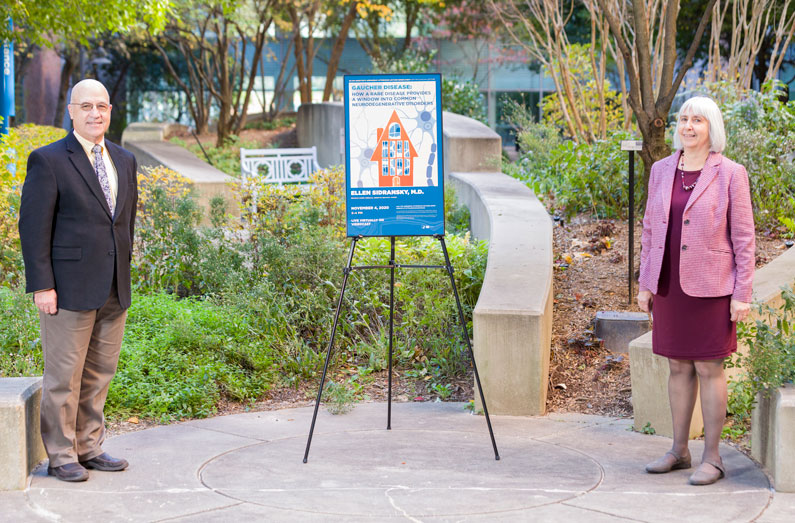Dr. Ellen Sidransky presents 23rd annual Astute Clinician lecture series

On Nov. 4, Dr. Ellen Sidransky, with the NIH National Human Genome Research Institute (NHGRI), spoke on "Gaucher Disease: How a Rare Disease Provides a Window into Common Neurodegenerative Disorders" as part of the annual Astute Clinician Lecture series. Gaucher disease is a rare disorder caused by a hereditary deficiency of the enzyme glucocerebrosidase, characterized by easy bruising, fatigue, anemia, low platelet count, and enlargement of the liver and spleen.
Since 1998, scientists such as Sidransky have had the honor of speaking at this lecture series because they have observed and investigated an unusual clinical occurrence that has opened an important new avenue of research.
Sidransky serves as the chief of the Medical Genetics Branch and head of its Molecular Neurogenetics Section in NHGRI. Her research includes clinical and basic research aspects of both Gaucher disease and Parkinson disease. She also played a lead role in establishing the association between glucocerebrosidase and parkinsonism.
During the lecture, Sidransky spoke about the complexity encountered in "simple" Mendelian disorders, the association between Gaucher disease and parkinsonism, and the development of small-molecule chaperones as therapy for Gaucher disease and potentially parkinsonism.
"Studies have shown that it is estimated that 3 to 12 percent of patients with Parkinson disease carry a variant in their GBA1 gene," stated Sidransky.
She went on to reference an international multi-center genetic study of GBA1 mutations in Parkinson disease.
"The study took place at 16 centers on four continents with 10,000 GBA1 genotypes from patients and controls and found patients were over five times more likely to have a mutation in GBA1, and GBA1 carriers had an earlier Parkinson onset and more cognitive deficits." She mentioned that "in the past 4 years, the number of publications on GBA1 and Parkinsonism have has risen rapidly."
The Astute Clinician lecture series was established through a gift from the late Dr. Robert W. Miller and his wife Haruko. Miller was a scientist emeritus at the National Cancer Institute (NCI) whose work led to a new understanding of cancer genetics. His wife was a research chemistry technician at NCI for most of her 27 years at NIH.
- Mickey Hanlon and Robert Burleson